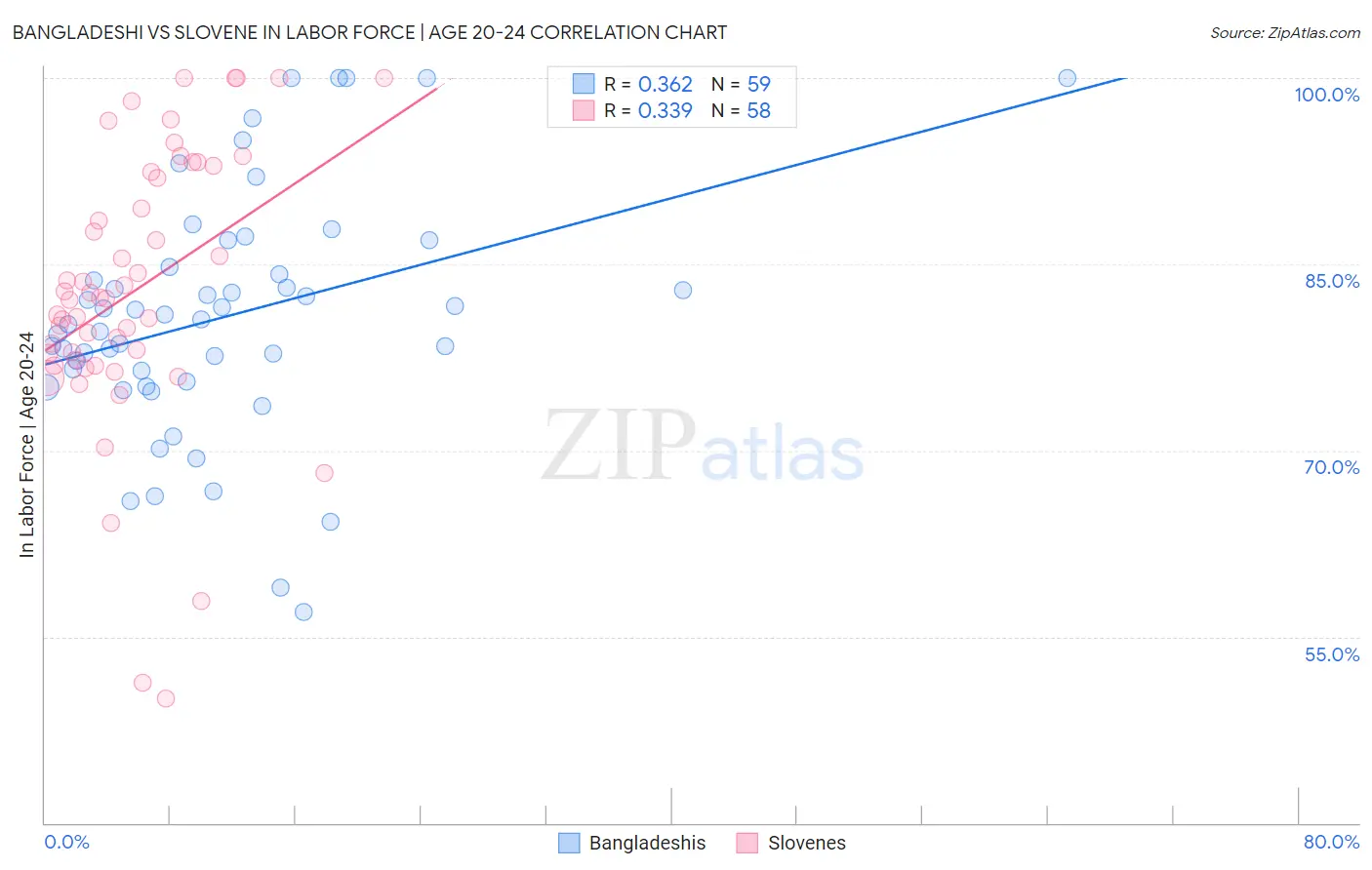Bangladeshi vs Slovene In Labor Force | Age 20-24
COMPARE
Bangladeshi
Slovene
In Labor Force | Age 20-24
In Labor Force | Age 20-24 Comparison
Bangladeshis
Slovenes
78.1%
IN LABOR FORCE | AGE 20-24
100.0/ 100
METRIC RATING
19th/ 347
METRIC RANK
78.7%
IN LABOR FORCE | AGE 20-24
100.0/ 100
METRIC RATING
10th/ 347
METRIC RANK
Bangladeshi vs Slovene In Labor Force | Age 20-24 Correlation Chart
The statistical analysis conducted on geographies consisting of 141,435,907 people shows a mild positive correlation between the proportion of Bangladeshis and labor force participation rate among population between the ages 20 and 24 in the United States with a correlation coefficient (R) of 0.362 and weighted average of 78.1%. Similarly, the statistical analysis conducted on geographies consisting of 261,217,826 people shows a mild positive correlation between the proportion of Slovenes and labor force participation rate among population between the ages 20 and 24 in the United States with a correlation coefficient (R) of 0.339 and weighted average of 78.7%, a difference of 0.74%.

In Labor Force | Age 20-24 Correlation Summary
| Measurement | Bangladeshi | Slovene |
| Minimum | 57.0% | 50.0% |
| Maximum | 100.0% | 100.0% |
| Range | 43.0% | 50.0% |
| Mean | 80.8% | 82.9% |
| Median | 80.6% | 82.3% |
| Interquartile 25% (IQ1) | 75.6% | 77.3% |
| Interquartile 75% (IQ3) | 84.7% | 92.5% |
| Interquartile Range (IQR) | 9.1% | 15.1% |
| Standard Deviation (Sample) | 9.7% | 11.1% |
| Standard Deviation (Population) | 9.6% | 11.0% |
Demographics Similar to Bangladeshis and Slovenes by In Labor Force | Age 20-24
In terms of in labor force | age 20-24, the demographic groups most similar to Bangladeshis are Immigrants from Bosnia and Herzegovina (78.1%, a difference of 0.0%), French Canadian (78.1%, a difference of 0.070%), Puget Sound Salish (78.0%, a difference of 0.14%), Pennsylvania German (78.0%, a difference of 0.20%), and Yugoslavian (78.0%, a difference of 0.21%). Similarly, the demographic groups most similar to Slovenes are Finnish (78.7%, a difference of 0.040%), German (78.6%, a difference of 0.15%), Swedish (78.8%, a difference of 0.16%), Scandinavian (78.5%, a difference of 0.21%), and Immigrants from Cabo Verde (78.9%, a difference of 0.22%).
| Demographics | Rating | Rank | In Labor Force | Age 20-24 |
| Alaskan Athabascans | 100.0 /100 | #4 | Exceptional 79.1% |
| Aleuts | 100.0 /100 | #5 | Exceptional 79.0% |
| Danes | 100.0 /100 | #6 | Exceptional 79.0% |
| Luxembourgers | 100.0 /100 | #7 | Exceptional 79.0% |
| Immigrants | Cabo Verde | 100.0 /100 | #8 | Exceptional 78.9% |
| Swedes | 100.0 /100 | #9 | Exceptional 78.8% |
| Slovenes | 100.0 /100 | #10 | Exceptional 78.7% |
| Finns | 100.0 /100 | #11 | Exceptional 78.7% |
| Germans | 100.0 /100 | #12 | Exceptional 78.6% |
| Scandinavians | 100.0 /100 | #13 | Exceptional 78.5% |
| Czechs | 100.0 /100 | #14 | Exceptional 78.5% |
| Sudanese | 100.0 /100 | #15 | Exceptional 78.4% |
| Dutch | 100.0 /100 | #16 | Exceptional 78.4% |
| Cape Verdeans | 100.0 /100 | #17 | Exceptional 78.3% |
| Immigrants | Bosnia and Herzegovina | 100.0 /100 | #18 | Exceptional 78.1% |
| Bangladeshis | 100.0 /100 | #19 | Exceptional 78.1% |
| French Canadians | 100.0 /100 | #20 | Exceptional 78.1% |
| Puget Sound Salish | 100.0 /100 | #21 | Exceptional 78.0% |
| Pennsylvania Germans | 100.0 /100 | #22 | Exceptional 78.0% |
| Yugoslavians | 100.0 /100 | #23 | Exceptional 78.0% |
| Liberians | 100.0 /100 | #24 | Exceptional 78.0% |